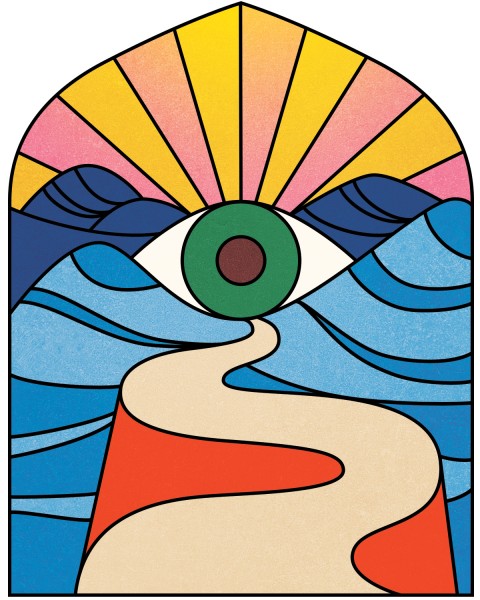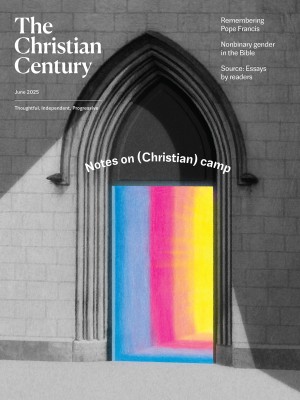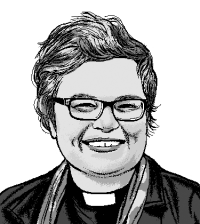In times of fear, I return to Julian of Norwich
The medieval mystic offers challenging words for desperate times.

Illustration by Katie Carey
“It is God’s will that we see him and search for him; it is his will that we wait for him and trust him.” In times of stress and fear—and goodness, it is hard to hear the world’s mood music as anything other than stress and fear right now—I return to these words from Julian of Norwich. They are taken from the second revelation or “shewing” of the 14th-century mystic’s extraordinary Revelations of Divine Love, the earliest surviving manuscript written by a woman in English. Ill and hovering near death, Julian saw a vision of the suffering Christ. It revealed something that offered a revolutionary spiritual pivot for people who felt like they were under divine judgment: that God is always and ever the abundance of love. Miraculously, Julian survived her illness and later became an anchorite.
Her words still resonate precisely because they are challenging words for desperate times. Though Julian’s background was privileged, the revelations she received were not the product of comfortable piety. Her life was shaped through an intense experience of personal loss, as well as of ill health, in a world marked like our own by war, turmoil, and plague. The Black Death, the English Peasants’ Revolt, and the emergence of the first Bible in English all unsettled what many presumed to be the natural order.
Read our latest issue or browse back issues.
It is perhaps unsurprising, then, that the visions Julian received were of Christ in his great suffering and passion. Indeed, the words I quote above were written in response to her vision of Jesus’ face covered in spittle and blood, dust and bruises, with insults thrown his way. Julian tells us that it was a physical vision but clouded and dim. This troubled her, as she wanted to see her Lord more clearly. However, she was told in her vision that if God wanted to show her more, God would be her light. She was invited to search. She writes:
This vision taught me that God is very pleased when we continually search for him. We cannot do more than seek, suffer and trust and this itself is the work of the Holy Spirit in the soul. . . . Seeking with faith, hope and love pleases our Lord and finding him pleases the soul, filling it full of joy. And so I learnt that as long as God allows us to struggle on this earth, seeking is as good as seeing.
“Seeking is as good as seeing.” I wonder how readily we believe this extraordinary insight of Julian’s. We are told, “Seek and you shall find” (Matt. 7:7), but so often such searching can feel forlorn, in this life at least. Like a lot of pastors, I’ve supported many people who long for peace of mind or stability. They’ve prayed fervently yet never seemed to find what they were looking for. On a wider community level, the search for justice can feel even more futile. When I lived in Jamaica more than 30 years ago, I was startled by the lived realities of friends and neighbors whose ancestors had been slaves and whose own lives were still scarred by the impact of that history. What really shocked me was the sense of intergenerational trauma and the costly impact of justice and restitution deferred. Seeking after what is right and seeing what is right done are not the same thing. “How long, O Lord?” (Ps. 13:1) is the cry for justice of all marginalized peoples throughout the generations.
Julian invites us to dwell in the dignity, beauty, and truth of searching after God’s goodness. She insists—in the midst of a world spinning out of control—on attending to Jesus Christ the Prince of Peace and Bearer of Wounds. Mysteriously, mystically, that attention draws us closer to God. “It is God’s will that we see him and search for him; it is his will that we wait for him and trust him.” This statement emerges from Julian’s deep encounter with God. She reminds us that God desires us but also that, in this life, even great mystics only see Christ through a veil. This experience of limit and limitation is not a reason for losing heart, however; rather it is a way marker on our path to deeper knowing. The searcher after God is like the woman who dared to touch the hem of Jesus’ garment and found blessing and grace. Julian inspires me to want to be a person who cries out to God, Let me stay close to you, O Lord, close enough to see and touch just one single thread.
I am so moved by these words: “It is his will that we wait for him and trust him.” I read them as tender and humble. I am horrified by the path Donald Trump, his lieutenants, and his apologists seem determined to pursue, but this too shall pass—and to wait on God is not passive. We wait on God not because God wants to keep us hanging on. Rather, God’s desire that we wait and trust stems from a deep love for us as frail creatures, negotiating the limits of being human in a filthy world. So often, we are not ready for God’s goodness. We are inclined to make God small in order to make sense of God, but divine glory and grace break out of our limitations. Just when we think we’ve got God where we want him, he rises from the dead. Our God is too much for most of us to bear: no powerful warlord, no king with a resplendent entourage and acres of bling. God’s kingdom calls this world’s kingdoms and powers to account, and that accounting comes in the only currency that truly matters: love.






